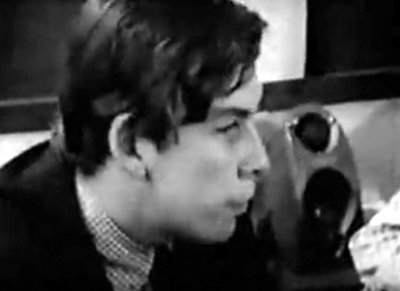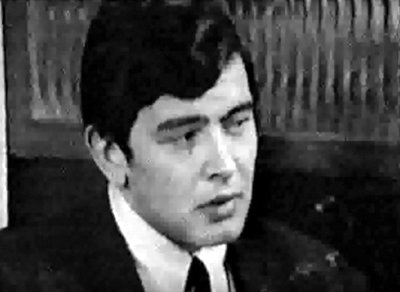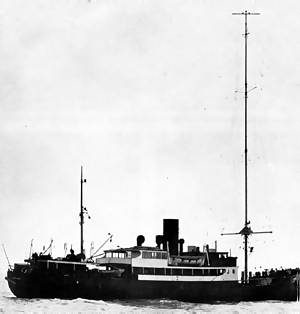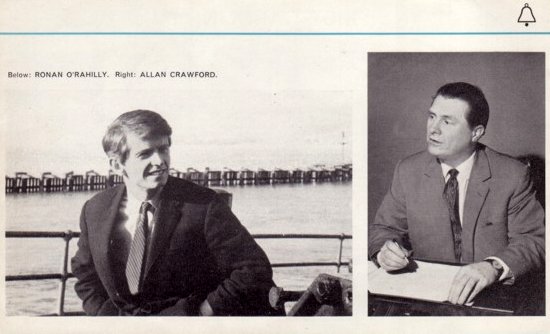While researching for his book Radio Caroline: The True Story Of The Boat That Rocked (reviewed here), author Ray Clark interviewed numerous people who were involved with the
station. One of these was Ian Ross, a member of the founding triumvirate along with Ronan O'Rahilly and Chris Moore.
We are very grateful to Ray for allowing us to publish the full transcript of the conversation on The Pirate Radio Hall of Fame.
If some of Ian's memories don't entirely match other people's recollections, this is not entirely surprising after fifty years but few people were as close to the action as he was in the early days of Radio Caroline. His is a unique
and fascinating tale. We have added notes to explain some of his references.
Ian obviously has very affectionate memories of the time with Caroline. He laughs throughout the interview as he remembers the various incidents and the people he was working with half a century ago.
The book which Ian refers to is his 1990 fictionalisation of the Caroline story called Rocking The Boat.
The interview took place in February 2013.
RAY CLARK: How did you get involved with (station founder) Ronan O'Rahilly - and Caroline? Which came first?
IAN ROSS: Ronan came first and Caroline next, obviously. I met Ronan in 1963 - fifty years ago. I guess it was around this time of year. Easter, I think it was. Spring anyway, spring '63, and he was a friend of a friend of mine
called Chris Moore. Really there were three of us who started it.
The actual true version of events is that three of us started Radio Caroline together. Chris knew Ronan and I'd only met him (Chris) recently but we became great friends and we shared a flat together in Milner Street in Chelsea. He
said “there's somebody I want you to meet” and “he's got this idea” and “you'll really like him”. Chris was a hustler of the old school, a Kings Road Cowboy type of guy that used to exist then.
They all had an American accent and a Hasselblad and a Pentax (cameras), you know. He used to sit in the Kenya Coffee Bar in the Kings Road and pull birds and drink cappuccinos. It was a great life and it's like so many things - it
is fifty years ago - but it's vanished now. It's not there anymore. The Kings Road is there but those people are gone, and the Kenya's gone. I think The Chelsea Potter might still be there. But anyway that life, what was Chelsea
(has gone). Anyway I was 19. I had come to London... I was born in London but we lived in Haslemere (Surrey). I had a feeling there was something much more happening to be found, not in Haslemere, so I had made my way to London.
I met Chris and, sure enough, this came along and I instinctively knew this was the thing - the swinging thing - that I'd been looking for.
So we went to the Kenya. We sat there for hours because Ronan's always late and then he suddenly appears, this little leprechaun, comes in, looks at all these hustlers (Irish accent) “How's it going baby? What's happening
here?” In those days you just didn't speak to people like that. Everyone was cool and never said anything. Anyway this guy appears and he looks at me and he had a big impact on me. I always remember Ronan - and I like to
remember Ronan - in that way. I'd never met anyone like him. He was a most entertaining, funny guy and everything he told me was pretty well the diametrical opposite of how I'd been brought up at my public school, and so on and so
forth. He was Irish and he has strong and legitimate republican credentials. His grandfather died at the Post Office[1] in 1916. He told me that this was all, you know, ‘the 1916 thinking’.
Radio Caroline was in line with this type of revolutionary thought. Another thing that you immediately realise when you meet him is how he's influenced by - and probably still is - by John F. Kennedy. If you asked Ronan what he did,
he would tell you he was in the ‘why not’ business. I know that's in the book but this sort of thing impressed me then. I thought “yes, the 1916 thinking, here we go”. Then I was told that actually he'd only
met me to see if I was cool, if I could dig it, if I was up to it. It wasn't so much to see whether I had the ability to get the money - which they both knew perfectly well... I was the perfect mark really, a complete lamb to the
slaughter with a rich dad who - they didn't know this but - was prepared to do almost anything to find me an occupation in life other than crashing cars and getting drunk! (laughs)
|

|

|
| Ian Ross, left, and Chris Moore, as they appeared on Granada TV's ‘World in Action’ programme in 1964. |
We met again later in the afternoon at the Carlton Tower (Hotel). There was a particular corridor there where he (Ronan) had set up, literally, a kind of headquarters. So you'd appear and he'd be there with
his documents and his whole bullsh*t and you'd think “yeah, this is a good deal”! The Carlton Tower ambience! So we met again and I had my car downstairs. In those days you could drive around, there was no parking trouble.
It was an MGB. He said “don't worry, I'll drive” and he drove my car, my MGB, at about 180 miles an hour all the way to Haslemere with me sitting in the back and Chris in the front, who was about 6 ft. 6. And that's how
it started.
We got there. I know that's in the book too but it is completely true. That part of the book is true. So my dad's there, looking kind of annoyed as usual, fiddling around with his tractor. That's what he used to do. He'd chop down
trees. He was a real pioneers-man. In 1963 he was 63. He was born in 1900 so (at that time) he's 63 years old, still operating in the city with his chums, you know, who used to have lunch and do deals. This was the old city - before
all the Mrs Thatchers and the red braces. These were people who wore bowler hats - not my dad but most of them, had an umbrella, got the 9.01, had lunch at the Savoy, shook hands on some tremendous god-knows-what sort of insider
dealing (laughs) and all made a f*ck of a lot of money doing it. He was a New Zealander and he had an ambivalent attitude towards the English posher classes, very ambivalent about it. He used to have to deal with them every day but
yet he wasn't one of them. He was an outsider, a complete outsider, and there was something about Ronan that he immediately really liked. I mean he just loved the guy. He went overboard for Ronan. I think they had some common bond in
being anti-establishment at heart. My dad, at heart, was anti-establishment but his friends who he rang up that evening were Jocelyn Stevens and his father-in-law John Sheffield[2]
who were very much the establishment - absolute figures of the establishment, solid characters - well, I um, I wouldn't call Jocelyn solid actually, he was completely crazy but, nevertheless, not a rebel really, you wouldn't have
thought - not of Ronan's Post Office 1916 variety anyway.
So this unlikely group of people came together on my dad's say-so and everyone put in a bit of money - a punt it would have been for them. They were all rich, let's just say, to put it crudely, but they were all entrepreneurs. They
all thought it might be great. Ronan said it will make millions a month. It sounded great. He sat there and he gave the spiel to old Jimmy - he started calling my father Jimmy. I couldn't believe he would call my dad Jimmy. You know,
the whole idea was unbelievable. You know (Irish accent) “ah Jayzus Jimmy, you won't believe it when you see this one coming”. Jimmy goes overboard for Ronan and, as I say, the whole thing was done in a day. (My wife)
Bunty sees him (Ronan) from time to time and he always says “oh anyone could have done it” (put up the money), you know. I think it's not unfair to say that he didn't much like my book. He doesn't like anyone taking credit
“f*cking with the lady”, all this kind of thing, but actually I'm not quite sure whether anyone else could have done it, or would have done it. And history doesn't work that way. I mean Napoleon won the Battle of Austerlitz.
Somebody else may have been able to win it but he won it. He was the one that did it. And we were the ones that backed Ronan, who had faith in him, who really asked no questions.
The whole lot, the money, was finally delivered in cash. I remember the day we got the cash. I don't remember how we got it - we may have gone to the bank or whatever - but we ended up with a suitcase with £150,000 - which in
those days was a fortune, a huge amount of money - and I know it affected us all in the same way, me Chris and Ronan. There was a sort of baptismal moment when we went to my flat - well Chris and my flat - I know that's in the book
too - we just destroyed the place. We threw the money in the air, we smashed every ornament, we danced round the room with Mrs Monday the landlady, you know, and we went crazy. F*cking crazy.
From then on the thing went remarkably according to plan. Ronan went to Galveston. He dressed himself up in a sort of cowboy suit and went to Galveston. Chris went to Rotterdam. Chris had worked on... I think he was a sort of a gigolo
or something on a cruise ship! He was a very good-looking guy. Supposedly a steward or in the purser's office but in fact I am sure a seducer of women (laughs) and he was deemed to be our man who knows about ships. On this very slim
evidence, he went off with £20,000 - I think I'm right in saying - in cash to Rotterdam and buys this really great ship, the Caroline. If you look at the pictures of it, it was beautiful. I was a ship-fancier, my dad too, we
loved ships and boats, and this was a beauty. That was great.
We were all very happy and I remember when Chris got back there was one very funny incident. We were in Ronan's flat. He'd bought the ship, Chris had, and we were sitting in his flat with these little girlfriends, Maria - Maria Jose -
I still know Maria, funnily enough. She was a great girl - and there was another girl. She was Georgie Fame's girlfriend and Maria's friend. Anyway we were all stoned out of our f*cking minds, sitting round, laughing and giggling,
and we'd got this ship! We couldn't believe it. And the phone rings. It is John Sheffield who was the most serious, conservative, important guy you could ever hope to meet and he starts asking Ronan what's going on. He said
“we've bought a ship, John. It's a beautiful thing” and John asks him what kind of ship. So Ronan - he was always doing this too - puts his hand over the receiver and (whispers) “he wants to know what kind of f*cking
ship it is” and Chris says “I don't know. It might have been a ferry boat” so he goes “John, Chris tells me that it was some sort of ferry boat. If you think about it, in Holland there's a lot of inland
waterways” (laughs) and he puts down the phone. It is one of those things when you laugh so hard you never forget it for the rest of your life. We were crying with laughter and it gave birth to this wonderful word
‘inland’. And Ronan, probably to this day, may still use the word ‘inland’. It became a verb as well. You can ‘inland’ somebody so, if you're bullsh*tting them... Ronan would... you'd be sitting
there, he'd go like that, he'd go ‘inland’ and you'd be ‘inland’ - which was what he was very, very good at. ‘Inlanding’ was probably Ronan's greatest talent. It was from that conversation when
John wanted to know what kind of ship we'd bought. If you think about it, it was the most ridiculous answer he could have possibly given for a ship that was supposed to sit in the bloody North Sea!
|

|
| The original Caroline ship, mv Fredericia. |
RC: So Chris had just gone off to Rotterdam on the off-chance of finding a ship?
IR: I don't know. I can't remember. We had these people - or Ronan did - these Dutch guys had probably lined it up. He'd just gone to give it the nod I think. He may have searched high and low and found the thing. I don't know. It was
fifty years ago. We had these people who in the book I call Vig Moller but they weren't called Vig Moller. I don't know. Can't remember what they were called.
RC: Wijsmuller
IR: Wijsmuller. There you are. The Dutch. The whole thing was run by the Dutch, you know, the sea crew, the skipper, all that stuff was done by them and they were the ones who towed it away in 1968 because
they hadn't been paid, that kind of thing, with Johnnie Walker still broadcasting. So probably they'd found the bloody thing - I don't know - but one way or another Chris went, got it, paid for it,
brought it... It had to go to... er, am I allowed to talk about this?
RC: I think so, yes. You're fine. I don't think you'll get arrested for it now!
IR: It was too long ago. A key ingredient of all this was that Ronan's father owned a private port on the east coast (of Ireland) not very far north of Dublin called Port Greenore, and without Greenore this couldn't have happened.
Where would you have fitted out the ship? There wasn't anywhere. He (Ronan) had been to Galveston, he'd bought the equipment, the mast - a 200 ft. mast, all this massive stuff which probably did cost a heck of a lot of money - it had
to be shipped somewhere. Greenore was the only place, if you think about it, and the ship was sailed to Port Greenore; the equipment was taken to Port Greenore; and we used to go there. We used to fly in this plane, for various
reasons... I mean it was really a joyride. One of the things that people can't really get now - and Ronan is a much more serious character, from what I gather, than in those days - probably we all ought to be - I am not all that
serious - but I just remember it being a piss-take and a laugh from start to finish. We had such a funny time, and it was such good fun, and Ronan was so funny and amusing and all the rest of it. And his family and all the Irish
that we used to see when we went over there - all crazy! And all driving around at 150 mph, you know, and we went to see the ship. I may have made this up but I think there were people in balaclavas at the gate, you know, who had
guns. I think - but I may be wrong. I don't want to get in trouble (laughs). This was before the whole serious stuff, you know. Ronan's father was Chairman of Bord na Móna[3] - Aodogán.
His grandfather was The O'Rahilly[4] and Ronan's father was Aodogán. He was Chairman of Bord na Móna. He was a great friend of de Valera[5]. This was republican
aristocracy. So Ronan had these tremendous credentials - legitimate credentials - and I don't think that appealed very much to the government of Sir Alec Douglas-Home when the sh*t hit the fan.
There was one diversion into a terrific piece of actual piracy that he - or we - perpetrated on these Radio Atlanta characters... They came along, unfortunately. Before we were ready. This Australian person called
Allan Crawford had had the same idea and he'd bought a ready-made radio ship and it was sailing towards our designated pitch off - you know - wherever it was - off Harwich. And this was a crisis. A real crisis.
And I think Ronan was ‘inlanding’ Allan on various levels to try to get him to cool it. Allan had really extraordinarily bad taste in music. He used to do cover versions. Oddly enough his main guy who did these covers
was Elvis Costello's dad. I don't know if you know that.
RC: Yes. Ross McManus[6] wasn't it?
IR: Yes. McManus. He used to cover Elvis (Presley) records. Allan said “Elvis can't sing in tune” so he made all these cover versions. His great launch programme (on Radio Atlanta) was going to be called Mid-Morning
Musicale. We thought “if that happened, forget it! We're out of business right away.” But, as fate would have it, this ship gets in a storm and its mast gets blown down. It's in serious trouble and they have no
recourse but to play into the very hands of, really, their enemy - and they sail for Port Greenore. And that was the end of that as far as they were concerned. I think some crane dropped a concrete block on (their ship), you know,
accidentally, and they were out of action for quite a long time (laughs).
|

|
| Ronan O'Rahilly, left, and Allan Crawford, from the ‘Caroline Club’ booklet. |
RC: So the original plan wasn't for that ship to go to Greenore at all then. It was to go straight off to station.
IR: No. None of this would have happened in the way it did happen - or, I don't think, in the way that we would have wished it to happen - if they hadn't got blown off course and got caught in a storm and had to come to Greenore,
whereupon they were in Ronan's power. Then he could control the situation and we made a deal with them to have the two ships... We had Caroline North and Caroline South - the Mi Amigo, that was the name of the other ship and our
ship was the Caroline, and we were Radio Caroline South - oh actually, funnily enough no, we sailed north. I remember sailing north. We went north. Me and Chris went north. Everybody turned on their headlights
as we went up. This is afterwards. I'm getting ahead of myself.
So, anyway, the ship gets on station and I think the Mi Amigo was still effectively impounded so we had a clear run. We had this press conference. That was another tremendous piece of comedy because our offices originally were in
Queen magazine's building in Fetter Lane. Jocelyn sort of had this highly ambivalent attitude towards the whole project, and the public in general, but he was the chairman of it - or he wasn't - and he wanted to be incognito. We had
this press conference where he appeared in his British warm overcoat and a trilby pulled over his face! As if the whole press corps didn't know who he was! Jocelyn Stevens - the heir-apparent to the Mirror building. I think he was
the godson of (chairman of Daily Mirror Newspapers) Cecil King. His building could look up at the Mirror building. He was a proper Fleet Street mogul. He was a Harmsworth and of the other family, you know... Hulton - Hulton and
Harmsworth. He was a blue-blooded Fleet Street press baron, anyway, incognito according to him! (Irish accent) “Come on everybody”. So Ronan appears with this enormous radio and all these Fleet Street hacks are sat there
drinking and he switches it on - nothing. Nothing happens. It was a complete fiasco. (Irish accent) “Oh hang on a minute, it will be...” and it turned out that because Fetter Lane is surrounded, literally, by the Mirror
building and all these steel structures, there was no signal. Our signal was not reaching Fetter Lane and that seemed a bloody disaster. So myself and Bunty, we set off in... this may have happened before actually - I may have got
this the wrong way round - we went in the MG. We whizzed around Kent and Sussex and Simon Dee was on board with Chris. I remember the call-sign was ‘ding-ding 199’ and the code word was
‘genius’ and he would play Ray Charles. He would play I've Got News For You I think or it may have been (Night
Time Is) The Right Time and we would pick this up and the call sign was ‘genius’. That meant Ray Charles. So we whizz around Kent and Sussex in the night, listening to this thing. Sure enough, the signal was
absolutely fine. The only problem was that Simon Dee had refused to go on the air and locked himself in his cabin. So Chris had to do the whole thing by himself, including pulling the switch and, if you think about it, that was a
revolution. It was a revolutionary act to pull that switch.
He tied the ship's bell round Simon's neck. He got a spoon and he hit the bell like that. The sound of the call-sign is him hitting the bell round Simon Dee's neck with this spoon - who had failed to be a proper revolutionary - thought
he was going to be put in prison (laughs). It was unbelievably funny.
There wasn't anything wrong with the signal. It just didn't reach Fetter Lane. So Ronan then did one of his many acts of genius. He got his hands on this MP, a Welsh chap. I remember he had one arm. He somehow was prevailed upon to
get up in the House of Commons and say to the Prime Minister, Sir Alec Douglas-Home, “what are you going to do about these pop radio pirates off the North Sea on this thing called Radio Caroline?” which no one had ever
heard of until that moment. And there was an uproar that some illegal person was broadcasting into the British Isles from a ship off the three mile limit - it was three miles in those days - and they were all horrified. They played
precisely into Ronan's hands. They sent a gun boat, if you please, they sent a gun boat which came out to the ship; went round and round the ship. Everybody's going like this, people were throwing bottles of beer to the sailors and
back, the sailors were laughing, you know “what are they going to do? Are they going to blow it out of the water?” and of course it hit the headlines just as Ronan would have wished and everybody knew about it suddenly.
Like that. Sir Alec sent the gunboat.
NOTES
|

